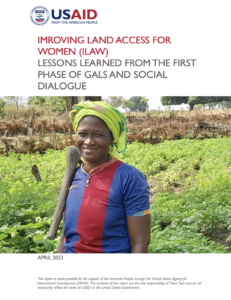 The goal of the Improving Land Access for Women (ILAW) Activity is to increase social cohesion, reduce land conflicts, and empower women to contribute to their communities economically by strengthening their legal access to land in the Northern and Western regions of Côte d’Ivoire (CDI). ILAW will achieve this goal through two performance objectives:
The goal of the Improving Land Access for Women (ILAW) Activity is to increase social cohesion, reduce land conflicts, and empower women to contribute to their communities economically by strengthening their legal access to land in the Northern and Western regions of Côte d’Ivoire (CDI). ILAW will achieve this goal through two performance objectives:
• Objective 1 – Empower communities in Northern and Western CDI through awareness raising, advocacy, and communication campaigns on land and women’s rights in Western and Northern CDI; and
• Objective 2 – Strengthen women’s access to legal and conflict mediation services in rural and urban areas to ensure their access to land in Northern and Western CDI.
At the beginning of ILAW, two baseline studies were carried out to understand the overall situation of gender inequalities with respect to land in the project’s intervention zone.
These baseline studies highlighted five (05) main dynamics ripe for change:
1) The marginalization of women in the processes of discussion and decision-making around land at the level of the nuclear family, extended family, community and village;
2) The poor application of legal provisions on women’s land rights, especially with respect to inheritance;
3) The unfavorable treatment of women in land disputes compared to men;
4) The exclusion of women from obtaining land documents including titles, contracts of use and wills;
5) Lack of action by community and government officials to proactively reduce land discrimination against women and negative attitudes and beliefs around women’s property rights.
To contribute to changing these dynamics, the project undertook two complementary programmatic approaches.
The first approach was Social Dialogue (SD) around 5 themes using short videos produced by local partner INDIGO. This approach is premised on the fact that transformation is possible when people have the opportunity to participate in constructive and change-oriented discussions. The videos were developed using testimonials from community members themselves. In total, approximately 200 dialogue sessions were organized by the project’s local partners, namely Council for Humanitarian Assistance and Development/CAHD (West) and Animation Rurale de Korhogo/ARK (North).
The second approach was the Gender Action Learning System (GALS). Developed in East Africa by OXFAM, GALS has three transformative phases for building gender justice with the help of participatory visual tools. GALS uses household economic development as the entry point for discussions about the distribution of resources and labor between men and women with the aim of increasing benefits for everyone. With the help of an external consultant, ILAW adapted the GALS methodology to its context. The first phase focused on the household level and was led by project partners (ARK and CAHD) with technical support from ILAW specialists.
ILAW made the decision to start with these social dialogue and GALS activities in order to create a favorable environment for change, based on the theory that this change is only possible when people have spaces for discussion and reflection, and that they perceive the link between their economic advancement and gender justice. This is also in line with the “Do No Harm” approach of the project insofar as ILAW did not wish to undertake awareness-raising and communication activities without this preliminary phase of dialogue, at the risk of generating misunderstandings or worse.
In line with its Complexity-Aware Monitoring, Evaluation and Learning plan (CAMEL), and its Annual Work Plan (AWP) 2022-2023, ILAW organized a pause and reflect workshop in January 2023 to discuss among staff and partners the main results and trends from social dialogue and GALS. This report built upon those reflections and is organized as follows: results and lessons learned from GALS (Part One), followed by the main achievements and the lessons learned from social dialogue (Part Two) and finally reflections on next steps including recommendations (Part Three).

